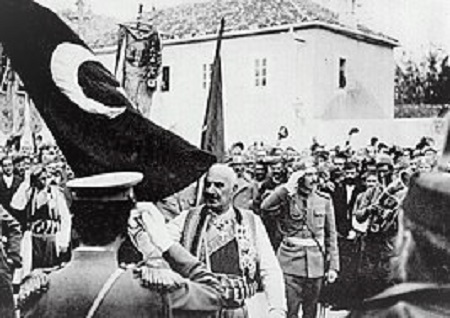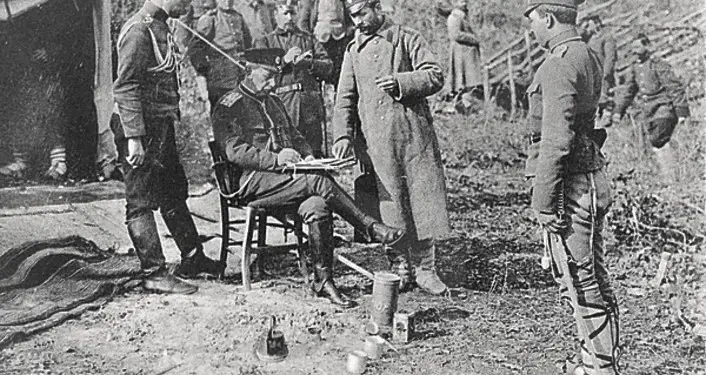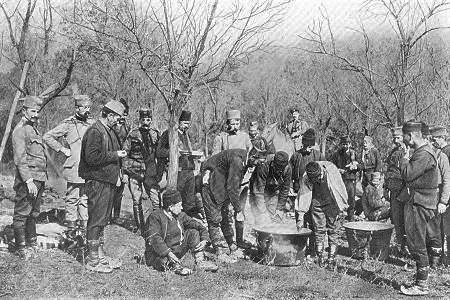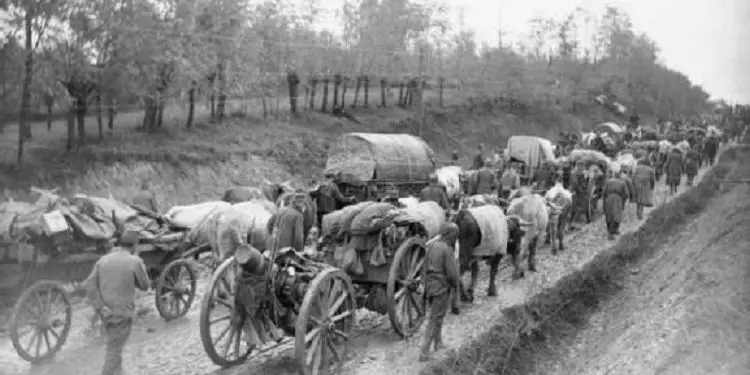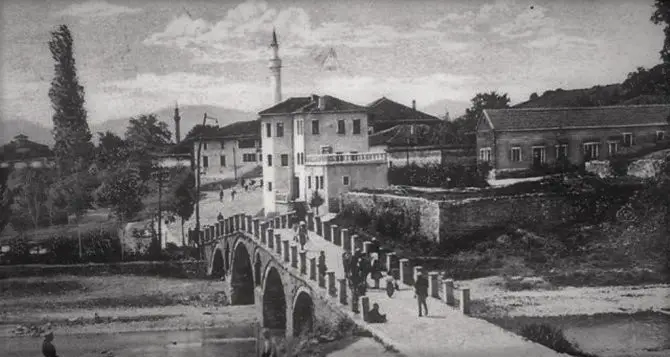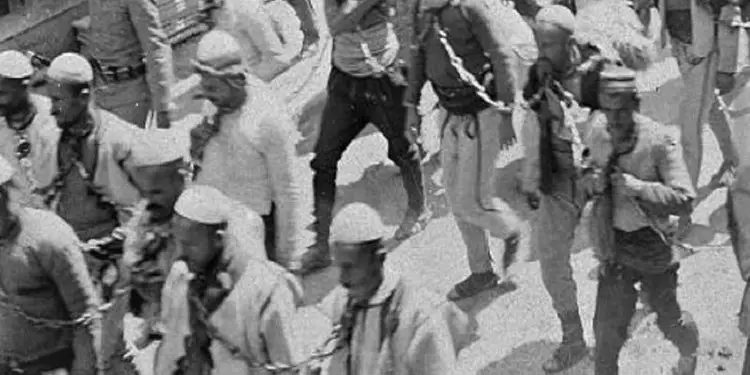From Bashkim Trenova
Part fourteen
INSTEAD OF THE PROLOGUE – A PROJECT, TWO MEMORANDA AND AN ANALYSIS
The Project or Nacertania of Ilia Garasanin – politician, prime minister of Serbia during the years 1852-1853 and 1861-1886:
MYTH-MYSTICISM, VICTIMOMANIA, RACISM AND SERBONOSTALGIA
ALBANIANS ACCORDING TO THE SERBS
(THE EASTERN CRISIS AND THE BALKAN WARS)
Memorie.al / “Serbs are descended from the Slavs, a large number of tribes who gave life to the Slavic peoples. Knowledge about the origins of the history of the Slavs is modest and not so clear. Their name appears for the first time in the 6th century AD, when Byzantine writers start talking about the Slavs….”! (Dushan Bataković, Milan St. Protic, Nikola Samardžić, Aleksandër Fotic. History of the Serbian People. L’Age d’Homme. Lausanne. 2005. Pg. 3.)
The Albanian uprising of June 1912 provoked the fall of the government of the Young Turks. The new government of Gazi Ahmed Muktar Pasha dissolved the Young Turks movement and imposed a state of emergency. This “neutral” government stopped any action against the Albanian rebels allowing them to express their wishes. They demanded new elections, the right to bear arms, a general amnesty and acceptance of Islamic law. The withdrawal of government forces allowed the Albanians to take control of Kosovo and North Macedonia. They even entered Skopje. The Turkish government failed to deport them before August 20. (2)
—
The Serbian government was daily informed about the turmoil in Macedonia. Reports of looting committed against Serbs living in the regions of Skopje, Kumanovo and Kosovo reached Belgrade every day. Ultimately, the Balkan allies decided to act only after the Albanian uprising and Berchtold’s initiative, which threatened to impose a reorganization of Turkey in favor of the Albanians. It was therefore necessary to create an Albanian state against the advance of the Slavs. The Serbian victory in the Second Balkan War was a moment of glory. The objective of an entire nation was achieved: “Old Serbia” – Kosovo and Macedonia were liberated. (1)
1 – Vojislav G. Pavlovic. La France et l’espace youugoslaves : la naissance de la Yougoslavie (1878-1918) – France and the Yugoslav space; the birth of Yugoslavia (1878-1918) -Balkanološki institute SANU, Jan. 1 2015. Pp. 139-140.
2 – Right there. Pg. 150-151.
Serbian objectives were twofold. Access to the Adriatic Sea had to be secured, but the inclusion of the Albanian territories in the Serbian state was also dreamed of. This was necessary to ensure a land connection with the future Serbian port. On the other hand, Albanians were not believed to be capable of forming an independent state. Divided into three monotheistic religions, divided into two tribes, Gege in the north and Toska in the south, the Albanians seemed to lack the necessary skills to form an independent state.
The Serbian victory in the Balkan wars is the result of a long process of more than thirty years, which ends with the creation of the Serbian national identity. The national issue, more precisely that of the Serbs of the Kosovo vilayet, was embraced by the majority of Serbian recruits in October 1912. Their war chief was, according to all logic, Nikolla Pasič, the architect of the introduction of the Serbian peasantry into politics.
1- Vojislav G. Pavlović. La France ET l’espace youugoslaves: la naissance de la Yougoslavie (1878-1918) – France and the Yugoslav space; the birth of Yugoslavia (1878-1918). – Balkanološki institute SANU, 1 Janv. 2015. Pg. 153, 155; 161-164; 170 and 183.
****
Vuk Drashkovic – writer and politician, leader of the Movement for Serbian Renewal, deputy prime minister and minister of foreign affairs:
Why are the Serbs looking for Kosovo while 92% of Albanians live in this region and while they (as Mr. Kadare insistently underlines) are descendants of the Illyrians, the oldest people in the Balkans? The answer requires a glance, even a quick one, at history. Kosovo is for Serbs the epicenter of their culture, their faith and their national memory. There, on June 28, 1389, they faced Ottoman forces three times their own, and lost the battle. This region has become a symbol of national tragedy, but also of a centuries-old aspiration. (1)
—
After the First War, the Kingdom of Yugoslavia established three legal systems: the first was a European system for Serbs, Croats and other Christians; the second was that of the Sharia for Muslims and the third, very specific and in accordance with the Albanian tradition, that of the Albanians of Kosovo. Albanian society has tribal laws, blood feud or family revenge.
After a murder, all members of the victim’s family can kill any member of the murderer’s family. The law of the Kingdom of Yugoslavia allowed them this. According to tradition, Albanians can have three, four, five wives, forty children…!
The cause of the Kosovo tragedy is the project of a great Albania. This project is old, the Albanian mafia of Kosovo, since forty years, controls all the political, economic and legal power of the Region and commands organized terror against the Serbs, expropriating them, abusing their children, poisoning the drinking water. , destroying their historical monuments, burning churches and desecrating the graves of their dead. (2)
1 – Vuk Draskovic. Confrontation with truth. (Facing the truth). Le Monde Diplomatique, April 1989. Pg. 8. Serbian-Albanian relations.
2 – Vuk Draskovic. Les ambitions d’un nationaliste de longue date. – The ambitions of an early nationalist – (Interview published in L’Humanité on June 12, 1999).
—
Kosovo is for Serbia the same as the Vatican for the Roman Catholics, or Jerusalem and Zion for the Jews, or the Land of Vladimir for the Russians. Kosovo was the heart of their medieval state, of their culture and national epic. From there, in 1389, Serbian messengers spread towards France to inform Christian Europe that Sultan Murat I had been killed and that the Serbs had won the victory in the Field of Mellenjave (Kosovo). By the time the Parisian churches were ringing the bells of victory, the Serbian army had been annihilated.
The messengers, in all probability, jumping on their horses as soon as the sultan’s head fell to the ground, had not waited for the end of the battle. Today in this region, barely 10% Serbs are counted. The terror organized by the Albanians in April 1941, with the fall of the Kingdom of Yugoslavia, has practically not stopped for a single day. Since this time, the Serbs of Kosovo have faced the violence of the Albanians and they no longer have a homeland. There were over three hundred thousand who left this region during forty years. And the land was colonized by an invading army of two hundred and fifty thousand migrants from Enver Hoxha’s Albania. Thus, on the sacred land of the Serbian people, Tito’s victorious partisans assisted in the birth of an Albanian state. Now, the desire of the Albanians of Yugoslavia to join this territory to mother Albania is completely legal. (1)
—
1 – Vuk Draskovic. L A Y O U G O S L A V I E E T L A SERBIAN QUESTION. (Yugoslavia and the Serbian question.) Revue des deux mondes. 2016/11. Pg. 61.
2 – Right there. Pg. 71.
Media:
Hilandar, bulletin of the monastery of Hilandar, no. 12,1983/4:
The tragic and famous Kosovo has become the pan-Serbian cradle and grave: the cradle of birth for Christ and the grave of death for Christ, to be resurrected again in Christ, here on earth as well as up there in the heavens.
****
Hriscanin, January 1913, p. 12:
Christ is born! O Great Serbia!
O city of Prizren, shout loudly for Adria to hear!
Christ is born, Fushë-Kosovo.
Glorious Kumanovo, Skopje of Dushan!
O white Prilep, O rich Bitol;
O Durrës on the coast, O gate of Serbian happiness!
Christ is born! Serbian priests already are
Angels of war!
—
Christian. June 1913, pg. 83:
The fate of King Peter is connected with the fate of our people. Therefore, the grateful Serbian people will celebrate this birthday, since under His supreme command the Serbian army has made the Serbian name famous, raised the prestige of Serbia, freed hundreds of thousands of captive brothers and conquered many countries.
Let our warm prayers be heeded for the health, happiness and long life of King Peter, so that under his wise rule Serbia may include all the Serbian people and make a place for itself in the ranks of great cultured states.
****
L’Orthodoxie, no. 385; 1.05.1983.
We know that the flow and reflux of the “river of exodus that has been flowing for decades” and centuries, have not stopped and have not calmed down for the Serbs of Kosovo. Let us at least keep hope in the strength of the Kosovans of Serbia, in the Christian religion, in the Orthodox religion that reconnects the grave with the Resurrection, and believe in the strength of the Cross and the Resurrection of the Serbian Orthodox testament of Kosovo.
****
Pastirska rec. 24.9.1913:
Every Serb has known that the Turk is a bad seed, that the committees must be helped to eradicate the impure Turkish and Albanian blood, that the days of freedom will come, the days when revenge will be realized.
****
Politics. 18.09. 1912. (Proclamation of the King of Serbia, Peter I Karagjorgjevic):
Recent events have once again put on the agenda the decision of the fate of the Balkan Peninsula, i.e. also of Old Serbia, this glorious but sad mother of our Kingdom, where the nucleus of the Serbian state is located, of the old kings and tsars, where the glorious capitals of Njemaniče are located: Rasi i Novi Pazar, Prishtina, Skopje, Prizren.
Such a situation had been created that no one was satisfied with the situation in European Turkey. The Serbs, the Bulgarians, the Greeks, and the Albanians were also unhappy.
Therefore, in the name of God, I have ordered our heroic army to start the holy war for freedom.
My army, along with Christians, will also find Albanians, Christians and Muslims, with whom our people have lived together for 1300 years, usually sharing joys and sorrows with them. We are bringing freedom, fraternity and equality to everyone. Our Serbia will bring the desired peace and progress there, as it gave to the liberated districts in 1877-1878. Free, progressive, conscious and satisfied citizens live in them. We must also establish this life on the banks of Llap, Sitnica, Ibri, Drin and Vardar.
Politics; 10.10.1912:
Old Serbia is not only a classical Serbian country, in which the strongest free state has developed, which at the time of the last Germans had supremacy over the Balkan Peninsula. It is not just like Bosnia or Dalmatia, a Serbian country where Serbian is spoken and heard. There is a Serbian tribe everywhere, as it is in Srem, Bačka and Banat, Bosnia, Herzegovina and other Serbian regions.
—
Politics; 21.10.1912:
Arnaut is all about crime, mixed with meanness and deceit.
—
Politics; 4.11.1912:
For centuries, this Earth’s heart has cried for the Sea. She remembered the wealth and glory of the past.
The sea tells me: once my blue waves kissed the recesses of your Earth – my lost mother. Where is that Earth? While the children of this Earth answered with shame: The wild herds of barbarians came and came between you and your mother.
While the earth, seeing its children for centuries in captivity say: My children, the blessed day has come. Following the footsteps of your blood, go to the Sea!
The children obeyed. With a heroic fight, they repelled the centuries-old enemy. Over the corpses the happy children step, breaking the road: Earth seeks its own Sea. Let’s hurry.
At the edge of the Sea, drunk with victories, they stopped. And they called: Mother, we are returning the Sea to you!
—
Politics; 11.11.1912:
Saint Archangel Mihailo was the baptismal name of Tsar Dushan, that’s why everyone was rushing to the church…! Before the end of the liturgy, mass was held, as our proud army unfurled the Serbian flag on the shores of the Adriatic Sea.
—
Politics; 12.11.1912:
A month ago, our troops crossed the border, while today we have two new occupied Serbia, an area twice as large as the entire homeland of those soldiers, few in number, but today famous all over the world.
—
Politics; 12.11.1912. (Greeting of Metropolitan Aksentije, in the exarchic church of Manastir, to the heir to the throne):
As a reward for your fallen heroes and for the spilled Serbian blood, we surrender to You, our Alexander of Macedonia, while we send our prayers to God for the happiness of Serbia and Her Alexander the Great and the victorious Serbian army.
—
Politics; 16.11.1912:
The famous Serb Gjergj Kastriotić, called Skenderbeg by the Turks, died in Lezha, where he had gone to consult with other Serbian leaders on how to resist the Turks to the end. This happened in 1467…
—
Politics, 16.11.1912:
The high command created the Serbian region called “Durres County”… Arnauts will get all the freedoms and in this true state freedom they will be ennobled, Serbia will realize a cultural work. —
Politics; 9.12.1912:
The circumstances are there and the time has come to talk about Serbia’s demands as well. Her demands are clear, justified and natural.
Serbia fully fulfilled its duty in this war. All the territory it conquered is populated by its citizens; all the people she liberated are happy for the union with Serbia.
So Serbia at this moment has the duty to provide him with peace and a future, while the best guarantee for this is the division of Albania between Serbia and Greece.
—
Politics. 9.12.1912. (“In the hospital”. Fejton of the writer Ivo Qipiko):
I stood next to the graft of a young Chetnik. I felt redundant and unnecessary in front of this seriously wounded Chetnik.
Before this bright figure, I also understood these Chetniks of ours, who give their lives for our common thought.
I felt deep in my soul that these first wounded bear with them the sign of the resurrection of our captive brothers.
—
Politics. 11.12.1912:
Serbia has not waged war with such ambitions, not even according to any imperialist policy. It neither wanted nor intended to oppress other peoples.
—
Politics; 28.12.1912:
The Serbs, with the price of their blood spilled in the river, achieved their rights as heirs. After all, they could very well claim access to the sea, since most of the occupied Albanian territory once belonged to the Serbian empire.
****
Samouprava 30.10.1912:
We regret that we have to point out that the Albanians did not have and did not ask for a separate territory, that in the middle Ages they were the territory of the Serbian and Byzantine (Greek) states; that this proves their incapacity for independent state life. No circumstance of culture and civilization justifies a separate Albanian territory. On the contrary, the circumstances of European culture and civilization speak strongly against it.
—
Self-help; 27.10. 1912:
That element, through which Serbia passes all the way to the sea, is an Albanian element, which it has had before, in the past, when it had Durrës. She will not now go out to sea for the first time, nor is she going through this Albanian element for the first time.
Albanians are not capable of maintaining their independence. This is irrefutably proven by the centuries-old history and their cultural level. Therefore, it is more natural for the Albanians to remain in the territories of Serbia and Greece, as they were before the arrival of the Turks in the Balkans.
—
Samouprava (Autonomy of Albania), 3.11.1912:
The name Albania is a purely geographical concept, which is not accompanied by a concept of any Albanian nationality. The true Albanians are thought to be the remnants of the old autochthons in the Balkans, who were almost completely annihilated by numerous foreign influxes. Their last name, Arnaut, has nothing to do with Albania. These are Turkish ancestors, who took the Serbian lands, when the Serbs, under the leadership of their patriarchs, moved to Austria. They mixed with the remaining Serbs and remnants of the native Albanians.
Of their features they have preserved only the wildness. Memorie.al




